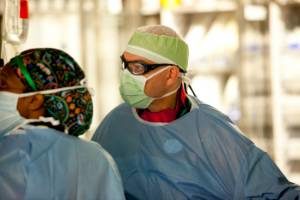Cooper is the newest formal member of the Armed Forces Institute on Regenerative Medicine (AFIRM), a multi-institutional and interdisciplinary network of 200-plus engineers, scientists, and physician-researchers from over 30 healthcare institutions and universities across the United States.
AFIRM’s research is being conducted by two consortia working with close to $300 million to make regenerative medicine a reality for our wounded warriors, especially those injured by blast injuries in Iraq and Afghanistan.
“The goal is to develop new technologies and therapies that will replace or regenerate human cells, tissues, or organs in order to restore or establish normal function due to injury or illness,” said Thomas N. Tulenko, PhD, Director, Surgical Research and Professor of Surgery, Department of Surgery, who serves as the senior scientist on all trials conducted at Cooper.
AUTOLOGOUS STEM CELLS
Cooper is the only academic medical center in the Delaware Valley participating and is currently conducting research using bone marrow stromal/stem cells (BMSCs) and adipose stem cells (ASCs). BMSCs are harvested from the iliac crest via needle aspiration. ASCs are derived from abdominal subcutaneous fat and are harvested via liposuction. Both types of stem cells are self replicating and can differentiate into a great many of the types of cells found in the human body without risk of rejection.
 “Our research is revolutionizing the future of medicine and surgery,” said Jeffrey P. Carpenter, MD, Chairman, Department of Surgery and Professor of Surgery. “Science fiction is quickly becoming reality and participating in such a groundbreaking venture places Cooper alongside the top research institutions in the country for the first time.”
“Our research is revolutionizing the future of medicine and surgery,” said Jeffrey P. Carpenter, MD, Chairman, Department of Surgery and Professor of Surgery. “Science fiction is quickly becoming reality and participating in such a groundbreaking venture places Cooper alongside the top research institutions in the country for the first time.”
Cooper is a member of AFIRM’s Rutgers–Cleveland Clinic Consortium, which also includes Carnegie Mellon, Harvard, MIT, Mayo Clinic, Dartmouth, Vanderbilt and several other world renowned research institutions.
FROM THE BENCH TO THE BEDSIDE IN RECORD TIME
“Our goal is to develop novel methods that can be taken from the bench to the bedside almost immediately,” said Dr. Tulenko. “We are using a person’s own stem cells to offer them hope they didn’t have before and to drastically improve their quality of life.”
The following two trials are currently underway at Cooper.
CRITICAL LIMB ISCHEMIA (CLI)
CLI affects nearly 10 million people in the U.S. and severely impairs a person’s functional status, quality of life, and puts them at extreme risk of major limb amputation and, possibly, death. Studies show that about half of the CLI are not candidates for traditional surgical techniques.
“Right now, there is very little we can do for these patients,” explains James B. Alexander, MD, FACS, Attending Surgeon, Division of Vascular and Endovascular Surgery and Associate Professor of Surgery. “We want to eliminate our patients’ pain and give them hope they can keep their limbs.”
Patients with CLI are being enrolled in a blind study using BMSCs in which their own stem cells are harvested, centrifuged and implanted into the patient during a 90-minute visit to the OR. It is expected that the stem cells will transform into blood vessels and restore blood flow within two to three months.
Fat grafting for breast reconstruction after mastectomy and/or radiation is a relatively new procedure that is a viable option for select women seeking cosmetic breast enhancement and for those in need of reconstruction. Fat grafted breasts help to make a more natural appearing breast than those with only implants or created via flap procedures. The procedure may also help with discomfort and pain.
Yuan Y. Liu, MD, Attending Surgeon, Division of Plastic and Reconstructive Surgery and Instructor of Surgery, performs this delicate procedure and is studying the use of fat grafting in patients with breast defects resulting from cancer treatment, specifically breasts treated with chemotherapy and radiation.
“Implants do not heal well within radiated tissue,” explains Dr. Liu. “Many women are left with defects, scar tissue and experience a lot of pain and mental anguish.
MORE HOPE ON THE HORIZON
More studies are being planned using ASCs and BMSCs for bone regeneration and for shoulder, hip and knee therapies.
To make an appointment with a Cooper Doctor click HERE.
